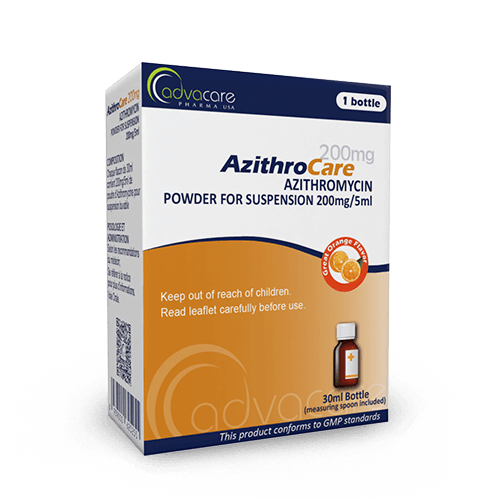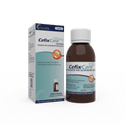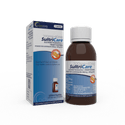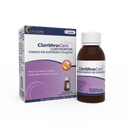- Home›
- Pharmaceuticals›
- Pharmaceutical Suspensions›
- Powder for Suspension›
- Azithromycin for Oral Suspension
Azithromycin for Oral Suspension
Dosage
Packaging
What is Azithromycin?
Active Ingredients: Azithromycin
Azithromycin for Oral Suspension is an antibiotic drug used to treat a wide range of bacterial infections, such as pneumonia, infections of the nose and throat, skin infections, Lyme disease, and some sexually transmitted infections. Azithromycin may be used by patients with hypersensitivity to penicillin.
Azithromycin is a broad-spectrum, semi-synthetic macrolide antibiotic. It is within the subclass known as azalides. The active ingredient works by inhibiting bacterial protein synthesis, which kills bacterial cells and prevents the growth of new ones. Azithromycin is effective against many gram-positive and gram-negative bacteria.
This drug is particularly noted for its extended half-life in the body, allowing for shorter courses of treatment compared to many other antibiotics. This characteristic also permits once-daily dosing, which can improve patient adherence to the treatment regimen.
After oral administration, Azithromycin is widely distributed throughout the body; its ability to concentrate in tissues and cells results in high tissue concentrations that can be sustained over a period of time. These properties make Azithromycin a convenient and effective choice for treating various bacterial infections, especially in outpatient settings.
Despite its broad-spectrum activity, the use of Azithromycin should be guided by susceptibility patterns of the bacteria in specific geographical regions and individual cases. Overuse or misuse of Azithromycin can lead to the development of antibiotic resistance. Use Azithromycin only when necessary and as prescribed by a healthcare professional.
AdvaCare Pharma is a GMP-certified producer and exporter of Azithromycin for Oral Suspension. This medicine is produced in our facilities in China, India, and the USA. These facilities are routinely audited to ensure they comply with health, safety, and environmental standards.
Why are we a quality Azithromycin manufacturer?
AdvaCare Pharma, a GMP-compliant pharmaceutical company, specializes in the manufacture of Azithromycin for Suspension. Our strategic manufacturing locations and innovative management systems ensure full control over the supply chain, resulting in enhanced quality standards and decreased costs throughout the production, transport and import processes. As a trusted Azithromycin manufacturer, we globally supply a comprehensive range of 55+ oral liquid medicines in suspension dosage form to more than 65 countries.
Uses
What is Azithromycin used for?
It is used to treat some types of bacterial infection, such as:
- pneumonia
- bronchitis
- sinusitis
- community-acquired pneumonia (CAP)
- sexually transmitted infections, such as chlamydia and gonorrhea
- disseminated Mycobacterium avium complex (MAC) infection
- strep throat
- traveler's diarrhea
How is Azithromycin for Oral Suspension used?
This medication is manufactured as a powder, which must be mixed in water before oral consumption.
After reconstitution, it is best to refrigerate (between 2°C and 8°C) the suspension to ensure its potency. It should remain stable for up to 10 days in ideal conditions.
Azithromycin for Oral Suspension should be stored in a dry and cool environment between 15°C and 30°C. It should be stored in a dry and cool environment. It should not be frozen.
What dose should be given?
For general bacterial infections, the usual dose for adults is 500mg per day for 3 days.
Refer to a doctor or pharmacist for guidelines on dosage. The dosage is based on medical condition, response to the treatment, age, and weight.
How does Azithromycin Oral Suspension work against bacteria?
Azithromycin inhibits bacterial protein synthesis by binding to the 50S ribosomal subunit, leading to the death of susceptible bacteria. This makes it effective against a broad range of gram-positive and gram-negative bacteria.
Is Azithromycin effective against viral infections?
Azithromycin is ineffective against viral infections like the common cold or flu. It should only be used to treat bacterial infections to prevent antibiotic resistance.
Can Azithromycin Oral Suspension be taken with food?
This drug can be taken with or without food.
How does Azithromycin Oral Suspension interact with antacids?
Taking Azithromycin concurrently with antacids containing aluminum or magnesium can decrease the absorption of the drug. Take Azithromycin at least 1 hour before or 2 hours after taking antacids to avoid this interaction.
Can Azithromycin Oral Suspension be used during pregnancy?
Azithromycin should be used during pregnancy only if clearly needed and after careful consideration of the benefits and risks. Animal studies have not shown harm to the fetus, but there are no adequate studies in pregnant women. Pregnant women must consult with a healthcare provider before taking this medication.
Is Azithromycin Oral Suspension safe for breastfeeding mothers?
Azithromycin is excreted in breast milk in small amounts. While it is generally considered safe for use by breastfeeding mothers, they should consult their healthcare provider to ensure safety for the nursing infant.
Can Azithromycin Oral Suspension be used for skin infections?
Azithromycin is effective in treating certain skin infections caused by bacteria, such as impetigo, cellulitis, and erysipelas. Confirm that the skin infection is bacterial in nature before using this drug.
Is Azithromycin Oral Suspension appropriate for patients with liver impairment?
Patients with liver impairment should use Azithromycin with caution, as it is metabolized in the liver.
Can Azithromycin Oral Suspension be used in elderly patients?
Azithromycin can be used in elderly patients, but it should be administered with caution, especially in those with pre-existing heart conditions or those taking medications that can affect heart rhythm. Elderly patients may be more susceptible to the cardiac side effects of this drug, including prolongation of the QT interval, and should be monitored closely.
Can Azithromycin Oral Suspension be used in combination therapy for complex bacterial infections?
Azithromycin Oral Suspension can be used in combination with other antibiotics for the treatment of complex or severe bacterial infections, where monotherapy might not be sufficient. This is often the case in hospitalized patients or in the treatment of certain respiratory or sexually transmitted infections. The choice of combination therapy should be based on the susceptibility of the bacteria involved and the clinical judgment of the healthcare provider.
How does the dosing frequency compare to other antibiotics?
One of the key advantages of Azithromycin Oral Suspension is its relatively infrequent dosing schedule, often requiring only once-daily administration. This is due to its long half-life, which allows the drug to maintain therapeutic levels in the body for an extended period. This dosing schedule can improve patient compliance, especially in outpatient settings, compared to antibiotics that require multiple doses per day.
How does Azithromycin Oral Suspension interact with warfarin?
This medication may potentiate the effects of warfarin, a blood thinner, potentially increasing the risk of bleeding. Patients taking warfarin should have their blood clotting time, or INR, closely monitored if Azithromycin is prescribed.
Can Azithromycin Oral Suspension treat Lyme disease?
Azithromycin is sometimes used as an alternative treatment for certain stages of Lyme disease, especially in patients who are intolerant to the standard therapies like doxycycline. A physician must be consulted first to verify.
Is Azithromycin Oral Suspension suitable for patients with kidney problems?
Patients with kidney problems should use Azithromycin with caution. While Azithromycin is primarily metabolized in the liver, impaired renal function can affect the elimination of the drug from the body.
What are the shelf life and storage requirements for Azithromycin Oral Suspension in a pharmaceutical distribution setting?
For businesses involved in the distribution or storage of pharmaceuticals like this drug, note that the shelf life of the dry powder before reconstitution is typically around 2-3 years when stored properly in a cool, dry place. After reconstitution, the suspension should be used within 10 days and stored refrigerated. These storage requirements are crucial for maintaining the efficacy and safety of the medication.
Side Effects
As with all pharmaceuticals, some unwanted effects can occur from the use of Azithromycin for Oral Suspension.
Common side effects include, but may not be limited to:
- mild diarrhea
- stomach pain and dizziness
- itching
- loss of appetite
- mild fever
- sleep problems
Seek medical attention if the following develop:
- watery or bloody diarrhea
- hives
- difficulty breathing
- irregular or fast heartbeat
- severe stomach or abdominal pain
- swelling of the face, lips, tongue, or throat
- unusually severe body reaction
For a comprehensive understanding of all potential side effects, consult a medical professional.
When experiencing mild side effects like diarrhea or stomach pain, it is often helpful to stay hydrated and eat bland, easy-to-digest foods. If side effects like severe diarrhea, intense stomach pain, or allergic reactions such as hives or swelling occur, these may indicate more serious conditions that require immediate medical attention.
Do not discontinue the medication without consulting a healthcare provider, as abrupt cessation can lead to the resurgence of the infection.
If any symptoms persist or worsen, or you notice any other symptoms, please call your doctor.
Precautions
Do NOT use Azithromycin for Oral Suspension if:
- You have had jaundice or liver problems caused by taking azithromycin.
- You are allergic to azithromycin or similar drugs, such as erythromycin, clarithromycin, telithromycin, or troleandomycin.
Due to possible drug interactions, consult with a doctor about any medications being taken before starting treatment.
Individuals with pre-existing conditions such as myasthenia gravis, a chronic autoimmune neuromuscular disease, should exercise caution when considering Azithromycin for Oral Suspension, as it may exacerbate muscle weakness.
Those with a history of cardiac rhythm disturbances, especially prolonged QT interval, should also consult their healthcare provider before using Azithromycin, as it can potentially lead to serious heart rhythm disturbances.
Consult with a doctor if the user has any health conditions.
There is not enough data available about the effect of azithromycin during pregnancy. Consult a doctor or healthcare professional before treatment. Azithromycin is excreted into human milk.
References
Azithromycin oral suspension in prevention and management of oral mucositis in patients undergoing hematopoietic stem cell transplantation: a randomized controlled trial
This publication investigated the effects of azithromycin suspension on oral mucositis in patients undergoing hematopoietic stem cell transplantation (HSCT).
It is a single-blind randomized controlled trial where patients undergoing HSCT were randomly assigned to either the intervention or control groups. For the intervention group, azithromycin suspension was administered twice daily by gargling for 30 seconds and swallowing, starting on the first day of chemotherapy. The main outcome was the occurrence of graded oral mucositis (OM) based on the National Cancer Institute Common Toxicity Criteria (NCI-CTC) scale (grade 0 to 5). The severity of OM symptoms was measured using the Numerical Rating Scale (NRS: 0–10).
Over 15 months, 88 patients were randomly assigned to the study, and 70 patients were evaluated for the outcomes (randomized 1:1 to azithromycin versus no-azithromycin). The intervention group showed significant improvements in the incidence and duration of mucositis compared to the control group.
Azithromycin use was associated with lower rates of dryness (P < 0.001), dysphagia (P < 0.001), and loss of taste (P < 0.001). The azithromycin group experienced less intense pain due to mucositis (P = 0.01) and a shorter duration of mucositis (P = 0.045). There were no significant adverse drug reactions in patients receiving azithromycin.
The conclusion is that azithromycin suspension is an effective option for the prevention and treatment of chemotherapy-induced OM.

You might be interested in...
Why AdvaCare Pharma?
As an industry leader, we are aware of our responsibility to provide affordable and sustainable solutions to improve healthcare worldwide.













